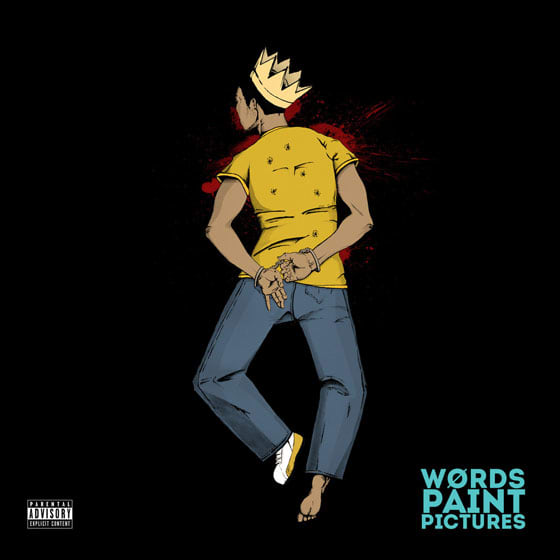The ghosts of Eric Garner, Michael Brown, Trayvon Martin and countless other wrongfully slain African Americans loom large on Words Paint Pictures, Rapper Big Pooh's new solo album; the North Carolinian MC's cover art — an animated still of a black man lying face down, handcuffed and riddled with bullet holes — makes his concerns about police brutality more than plain. And he only draws more unsettling imagery from there.
On "Stop," Pooh describes Brown as being "shot with his hands held high," before naming several other, lesser-known incidents where black men were gunned down by lawmen who "serve no protection, firin' shots off, no discretion." The beat, courtesy of ace Detroit producer Apollo Brown (who helms nearly all of the album's instrumentation), features a snare that rattles like yesteryear's chain gangs.
The MC also addressees America's incarceration issues on latter tracks like "Promise Land," with lines like: "They building private prisons just to house niggas for cheap labour," where those inmates are given a "series of numbers that replace your I.D." But, in a similar fashion to Kendrick Lamar's recent "The Blacker The Berry," Pooh doesn't simply save his ire for racist whites. On "Promise Land," he also confronts issues within the black community by spitting: "Let 'em hang niggas, hang by their gold ropes / Smoke dope 'til you comatose, no hope / For that butter, niggas die broke." Like Lamar, such bold critiques are bound to spark heated debates and, perhaps, even alienate some of Pooh's biggest fans, but open-minded listeners will appreciate such fearless introspection.
Apollo Brown is equally boundary-pushing behind the boards, building seemingly conventional beats (which begin with the usual samples of soulful vocals and scratchy vinyl) that are laden with unexpected surprises. On "How I Move," the producer eschews the far too typical "MC's verse, vocalist's chorus" pattern and instead lets Eric "Blakk Soul" Keith's reggae-tinged singing linger for the first minute and a half, before Pooh's rhymes finally — and climactically — kick in. Brown does the opposite on "Stop," letting Pooh dominate until Steve Roxx closes the track's final moment with some mournful crooning. It's a shame that Brown couldn't apply such formula-defying moves to the tone and tempo of those instrumentals, because too much of that music is downbeat and foreboding. That dark backdrop fits Pooh's lyrical themes well, but it starts to drag before Word's nine tracks are through.
Still, nine scant songs (the last two being sturdy remixes of earlier tracks, one of which comes courtesy of up and comer L'Orange) feel like far too little, given the compelling subject matter. Words Paint Pictures serves as a thoughtful, slow-burning soundtrack for the deep thinkers in America's "Black Lives Matter" movement. Next, Pooh and Brown should record a fiercer follow-up for those marching at the front of the picket lines.
(Mello Music Group)On "Stop," Pooh describes Brown as being "shot with his hands held high," before naming several other, lesser-known incidents where black men were gunned down by lawmen who "serve no protection, firin' shots off, no discretion." The beat, courtesy of ace Detroit producer Apollo Brown (who helms nearly all of the album's instrumentation), features a snare that rattles like yesteryear's chain gangs.
The MC also addressees America's incarceration issues on latter tracks like "Promise Land," with lines like: "They building private prisons just to house niggas for cheap labour," where those inmates are given a "series of numbers that replace your I.D." But, in a similar fashion to Kendrick Lamar's recent "The Blacker The Berry," Pooh doesn't simply save his ire for racist whites. On "Promise Land," he also confronts issues within the black community by spitting: "Let 'em hang niggas, hang by their gold ropes / Smoke dope 'til you comatose, no hope / For that butter, niggas die broke." Like Lamar, such bold critiques are bound to spark heated debates and, perhaps, even alienate some of Pooh's biggest fans, but open-minded listeners will appreciate such fearless introspection.
Apollo Brown is equally boundary-pushing behind the boards, building seemingly conventional beats (which begin with the usual samples of soulful vocals and scratchy vinyl) that are laden with unexpected surprises. On "How I Move," the producer eschews the far too typical "MC's verse, vocalist's chorus" pattern and instead lets Eric "Blakk Soul" Keith's reggae-tinged singing linger for the first minute and a half, before Pooh's rhymes finally — and climactically — kick in. Brown does the opposite on "Stop," letting Pooh dominate until Steve Roxx closes the track's final moment with some mournful crooning. It's a shame that Brown couldn't apply such formula-defying moves to the tone and tempo of those instrumentals, because too much of that music is downbeat and foreboding. That dark backdrop fits Pooh's lyrical themes well, but it starts to drag before Word's nine tracks are through.
Still, nine scant songs (the last two being sturdy remixes of earlier tracks, one of which comes courtesy of up and comer L'Orange) feel like far too little, given the compelling subject matter. Words Paint Pictures serves as a thoughtful, slow-burning soundtrack for the deep thinkers in America's "Black Lives Matter" movement. Next, Pooh and Brown should record a fiercer follow-up for those marching at the front of the picket lines.
